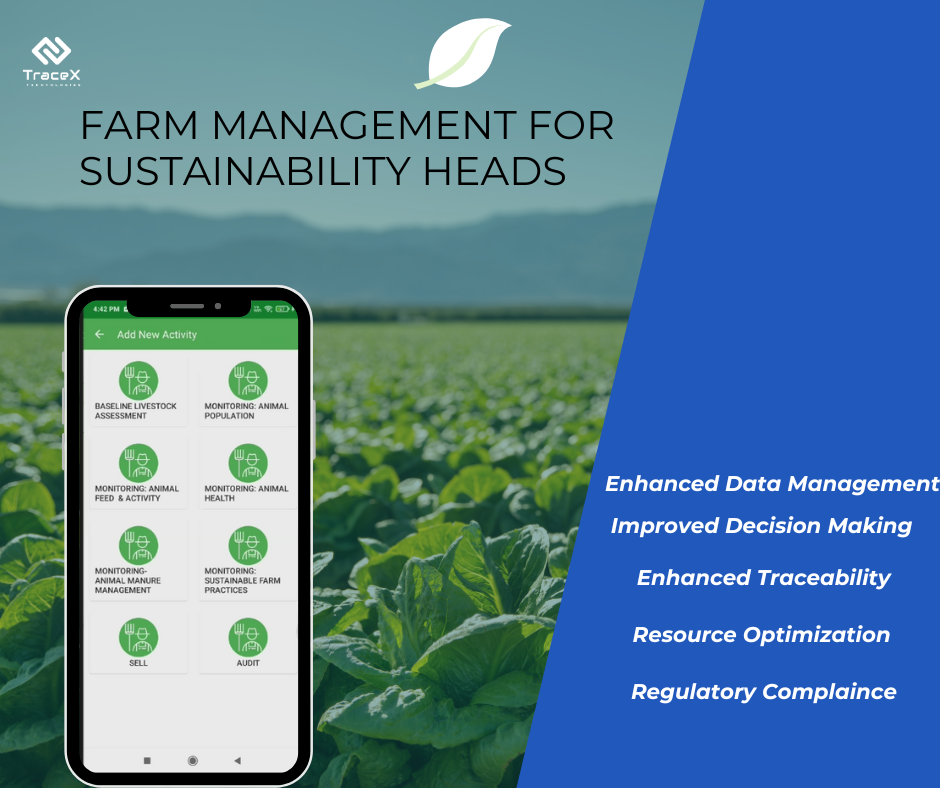Contact: +91 99725 24322 |
Menu
Menu
Quick summary: Unlock the synergy between farm management solutions and sustainability objectives! Delve into our blog to explore how TraceX's innovative solutions empower sustainability heads in driving eco-friendly and socially responsible agricultural practices. Discover the tools and strategies for achieving environmental stewardship and business sustainability.

There is a major change occurring in the agricultural environment. More food must be produced in order to feed the world’s expanding population. But this cannot be accomplished at the expense of deteriorating the environment. Achieving this fine balance falls on sustainability heads, the agricultural industry’s environmental stewards. Thankfully, new approaches to farm management are becoming strong partners in the fight to advance ecologically sustainable farming methods.
According to Research and Marketing, The farm management software market is expected to surge, reaching a projected value of USD 10.58 billion by 2030, with a compound annual growth rate (CAGR) of 16.2% from 2023 to 2030. This growth stems from the agriculture sector’s growing demand for improved efficiency and productivity, advancements in technology, and the widespread adoption of digital solutions within agriculture.
As one of Europe’s largest manufacturing sectors, the food and beverage industry holds significant sway, purchasing roughly 70% of all EU farm produce and driving the push towards sustainable food systems. However, it grapples with considerable challenges, particularly its substantial contribution to greenhouse gas emissions. Hence, adhering to environmental, social, and governance (ESG) standards and complying with the Corporate Sustainability and Reporting Directive (CSRD) are paramount objectives. Given its reliance on agriculture, F&B companies must actively support farmers in transitioning to more sustainable practices.
By enhancing agricultural production efficiency, minimizing input usage (fertilizers, chemicals, fuel), and embracing regenerative practices that prioritize ecosystem health, soil fertility, and biodiversity, global crop production can significantly reduce its environmental footprint. Additionally, implementing farm management software can streamline operations, optimize resource utilization, and facilitate data-driven decision-making, thus aiding F&B companies in addressing these challenges effectively.
Optimize your agricultural operations and boost productivity.
Discover the top 6 farm management practices
Before we talk about role of farm management solutions in sustainability, let’s understand what farm management solutions comprise. These encompass a variety of technologies and software platforms designed to assist farmers/corporates in planning, monitoring, and optimizing their operations. From crop management to livestock tracking, these solutions offer comprehensive tools to streamline farming processes.
Discover how VNV Advisory revolutionized rice cultivation with sustainable irrigation practices using TraceX’s Digital MRV Platform!
Explore the customer story now for insights into sustainable practices and environmental solutions.
5. Soil Health Management: Maintaining soil health is essential for sustainable agriculture. Farm management solutions offer tools for soil testing, monitoring, and nutrient management. By adopting soil-friendly practices guided by these solutions, farmers can prevent soil degradation, enhance fertility, and promote long-term sustainability.
6. Promoting Soil Health Through Cover Crops: Farmers can leverage farm management solutions to implement cover cropping strategies that enhance soil health. By analyzing soil nutrient levels and crop rotation schedules, farmers can select cover crops that replenish soil nutrients, suppress weeds, and improve soil structure. This not only reduces the need for synthetic fertilizers and herbicides but also fosters biodiversity and carbon sequestration.
7. Crop Monitoring and Pest Management: Timely detection and response to crop diseases and pest infestations are critical for sustainable farming. Crop Monitoring solutions integrate remote sensing technologies and AI-powered algorithms to monitor crop health and detect anomalies. This proactive approach enables farmers to implement targeted interventions, reducing reliance on chemical pesticides and fostering ecosystem balance.
8. Integrated Pest Management (IPM): Farmers can adopt integrated pest management practices facilitated by farm management solutions to minimize chemical inputs and preserve ecosystem balance. By deploying sensors and drones for early pest detection and scouting, farmers can implement biological control methods, such as releasing natural predators or deploying pheromone traps, to manage pest populations effectively. This holistic approach not only reduces environmental impact but also safeguards crop yields and farmer livelihoods.
9. Supply Chain Traceability: Transparency and traceability are gaining prominence in agriculture. Farm management solutions facilitate supply chain traceability by tracking each stage of production, from seed to shelf. This not only enhances food safety and quality but also enables consumers to make informed choices, supporting sustainability-driven purchasing behaviors.
10. Blockchain Technology for Traceability: Blockchain-based farm management solutions offer immutable records of every transaction and activity in the supply chain, ensuring transparency and traceability. By recording crucial information such as production practices, transportation routes, and storage conditions, blockchain technology enhances accountability and trust among stakeholders. Consumers can scan product QR codes to access detailed information about the origin and journey of their food, empowering them to support sustainable farming practices.
Farm management software transforms agricultural practices for sustainable and efficient crop cultivation
Unlock crop management with TraceX
11. Climate Resilience: Climate change poses significant challenges to agriculture. Farm management solutions help farmers adapt to changing climatic conditions by providing predictive analytics and climate modeling tools. By anticipating weather extremes and implementing adaptive strategies, farmers can mitigate risks and build resilience against climate-related disruptions.
12. Climate-Smart Agriculture: Farmers can embrace climate-smart agriculture practices facilitated by farm management solutions to enhance resilience and mitigate climate risks. These practices include agroforestry, conservation tillage, and water harvesting techniques tailored to local climate conditions. By integrating climate data and predictive analytics into decision-making processes, farmers can optimize resource use, reduce greenhouse gas emissions, and build climate-resilient farming systems.
Regulatory Compliance: Ensuring Adherence to Environmental and Labor Regulations
Compliance with environmental regulations and labor laws is a fundamental aspect of sustainable agricultural practices. Sustainability heads must ensure that farming operations adhere to a myriad of rules and standards, ranging from chemical usage and waste management to worker safety and fair labor practices. Failure to comply can result in significant fines, legal ramifications, and reputational damage.
Farm management solutions offer comprehensive tools to monitor and manage compliance across various areas of agricultural operations. These platforms enable sustainability heads to track pesticide and fertilizer usage, monitor water consumption, and maintain detailed records of waste disposal processes. Additionally, they provide robust functionality for tracking labor practices, including employee information, working conditions, and wages, ensuring adherence to ethical labor standards.
By leveraging these compliance management capabilities, sustainability heads can proactively identify potential areas of non-compliance and take corrective actions before issues escalate. Real-time data and analytics empower them to make informed decisions, minimizing the risk of regulatory violations and fostering a culture of environmental stewardship and ethical practices.
Mitigating the impact of agricultural activities on climate change is a pressing concern for sustainability heads. Setting and achieving decarbonization targets requires a comprehensive understanding of the carbon footprint associated with various farming practices, from soil management to transportation and distribution.
Farm management solutions offer powerful tools to support decarbonization efforts. These platforms enable sustainability heads to track and analyze energy consumption, monitor greenhouse gas emissions, and identify opportunities for optimization. By leveraging data-driven insights, agricultural operations can implement strategies such as precision farming, renewable energy adoption, and efficient transportation routing, ultimately reducing their carbon footprint.
Farm management solutions facilitate the integration of innovative technologies like drones and sensors, which can provide real-time data on crop health, soil conditions, and water usage. This information can be used to optimize resource utilization and minimize waste, further contributing to decarbonization goals and promoting sustainable farming practices.
TraceX farm management software presents a compelling solution for sustainability heads

The journey towards sustainable agriculture is paved with challenges, but farm management solutions offer a powerful toolkit for sustainability heads to navigate them. By empowering informed decision-making, optimizing resource use, and promoting healthy practices, these solutions pave the way for a future where environmental responsibility and economic success go hand-in-hand.
The impact extends beyond the farm gate. By adopting sustainable practices, farms contribute to a healthier planet, improved water quality, and a more resilient agricultural sector. Consumers, increasingly conscious of their food choices, benefit from knowing their food is produced responsibly.
However, the true power lies in collaboration. Farm management solution providers, sustainability heads, and farmers must work together to continuously refine practices and leverage the full potential of this technology. By embracing innovation and fostering a culture of continuous improvement, the agricultural community can ensure a thriving future for generations to come.
The time for action is now. Farm management solutions are not a magic bullet, but they are a powerful weapon in the arsenal of sustainability champions. As we work together, we can cultivate a future where agricultural practices are not just productive, but truly sustainable, ensuring a healthy planet and a secure food supply for all.
